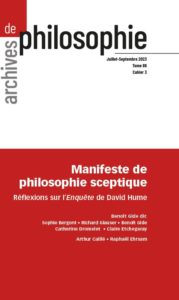 Volume 86, Issue 3, July-September 2023
Volume 86, Issue 3, July-September 2023
Manifesto of philosophical skepticism. Reflections on David Hume’s Enquiry
 Benoît Gide, On our responsibility for justice: Thinking the political with Iris M. Young. Foreword
Benoît Gide, On our responsibility for justice: Thinking the political with Iris M. Young. Foreword
Sophie Bergont, Reading Section 4 of An Enquiry Concerning Human Understanding
This paper consists of a commentary on Section 4 of An Enquiry Concerning Human Understanding. It has three aims: to explain the structure of the skeptical argument by which Hume deconstructs the rationality of causal inference, to shed light on the text by putting it into historical perspective (by opposing Hume to Locke, in particular), and to highlight the gesture of deepening empiricism that is at work here: the skeptical theory of causal reasoning can only be reached by going beyond the ordinary and immediate experience that one has of one’s understanding.
Richard Glauser, Hume and the question of the nature of belief
(1) Although Hume distinguishes several sorts of propositions, we explain why he focuses on causal inferences when he examines the nature of belief. (2) After considering the answers that Hume rejects concerning the nature of belief, we discuss his solution. (3) We highlight certain implications of Hume’s conception of the nature of belief, which is implicitly directed against Descartes’s theory of judgment. (4) We suggest an interpretation of the asymmetric role of belief in relation to passions and to action. (5) Hume’s position seems to meet with a difficulty: it seems ill-suited to account for the nature of negative existential beliefs.
Benoît Gide, Conflict between freedom and necessity. Hume’s skeptical solution
How does Hume’s skepticism concerning necessary connections allow for his solution to the question of liberty and necessity? First, we claim that an epistemological (rather than semantical) reading of this skepticism is sufficient to allow for the necessitarian element of the solution. Then, we claim that the compatibilist element of it depends on Hume’s naturalistic explanation of the inference of the mind from actions to motives. Because this naturalist explanation is itself skeptical in nature, we finally qualify Hume’s overall answer to the problem of liberty and necessity as a reconciling skeptical solution.
Catherine Dromelet, Hume on the moral authority of religion in the two Enquiries
In An Enquiry Concerning Human Understanding, Hume argues that religion does not possess any epistemic authority; therefore, it should not dictate our moral principles. But Hume also observes that religion has an impact on human behavior, which is why it may indeed have some moral authority. The Enquiry Concerning the Principles of Morals aims to show the secular origin of morality and to emphasize that religion doesn’t play any role in it. At the same time, Hume introduces religious metaphors and analogies when addressing the moral authority of social institutions. In this article I discuss Hume’s stance toward the moral authority of religion by examining his theory of moral duty and interpreting his use of religious vocabulary in the context of his secular moral philosophy.
Claire Etchegaray, What to do with skepticism? A humian inquiry into its meaning and absurdity
We examine how Merleau-Ponty, in close connection with his personal conception of being, tackles certain themes explored by Levinas, including desire, transcendence, alterity, and responsibility. Marked by a great attention to the perceived world, his ontology emphasizes the negativity of being as a springboard for our birth and coexistence. Undefined and relative, resistant and up-holding, being works our flesh in a dialectic of limitation and openness, to the point of freeing us from the ambivalence that hinders our relationships and concepts. Rich in ethical virtualities, this ontology positions itself against Sartre, believes itself incompatible with Heidegger, and sharply contrasts with Levinas—even with the reading that Levinas has made of it.
* * *
Arthur Caillé, How can we define bodies? Three disagreements in the 1692–1695 correspondence between Leibniz and Huygens
Despite Leibniz’s interest in Huygens’s physics, their 1692–1695 correspondence contains several disagreements, which reveal two different ontological conceptions of bodies. According to Leibniz, Kepler’s laws can be explained by a harmonic circulation, while for Huygens the explanation lies in the intrinsic heaviness of bodies. Moreover, for Huygens, there is an extension that has no body but that is nonetheless material, an opinion incompatible with Leibniz’s metaphysics. Finally, Huygens explains bodily cohesion by absolutely hard atoms; Leibniz rejects such entities, but completes the laws of relative motion by a substantial level beyond extension.
Raphaël Ehrsam, Metaphysics is political: Jules Lagneau on nature, freedom, and purposiveness
For Lagneau, philosophy and metaphysics are one and the same. By making such a claim, Lagneau defends the view that fundamental philosophical thinking is, and ought to be, independent of all political commitment. Conversely, this paper argues that there should be room for a critical materialist reading of the history of metaphysics. It therefore construes Lagneau’s cosmological, psychological, and theological ideas so as to make explicit their connection with his naturalistic, conservative, paternalistic, and anti-democratic positioning.
